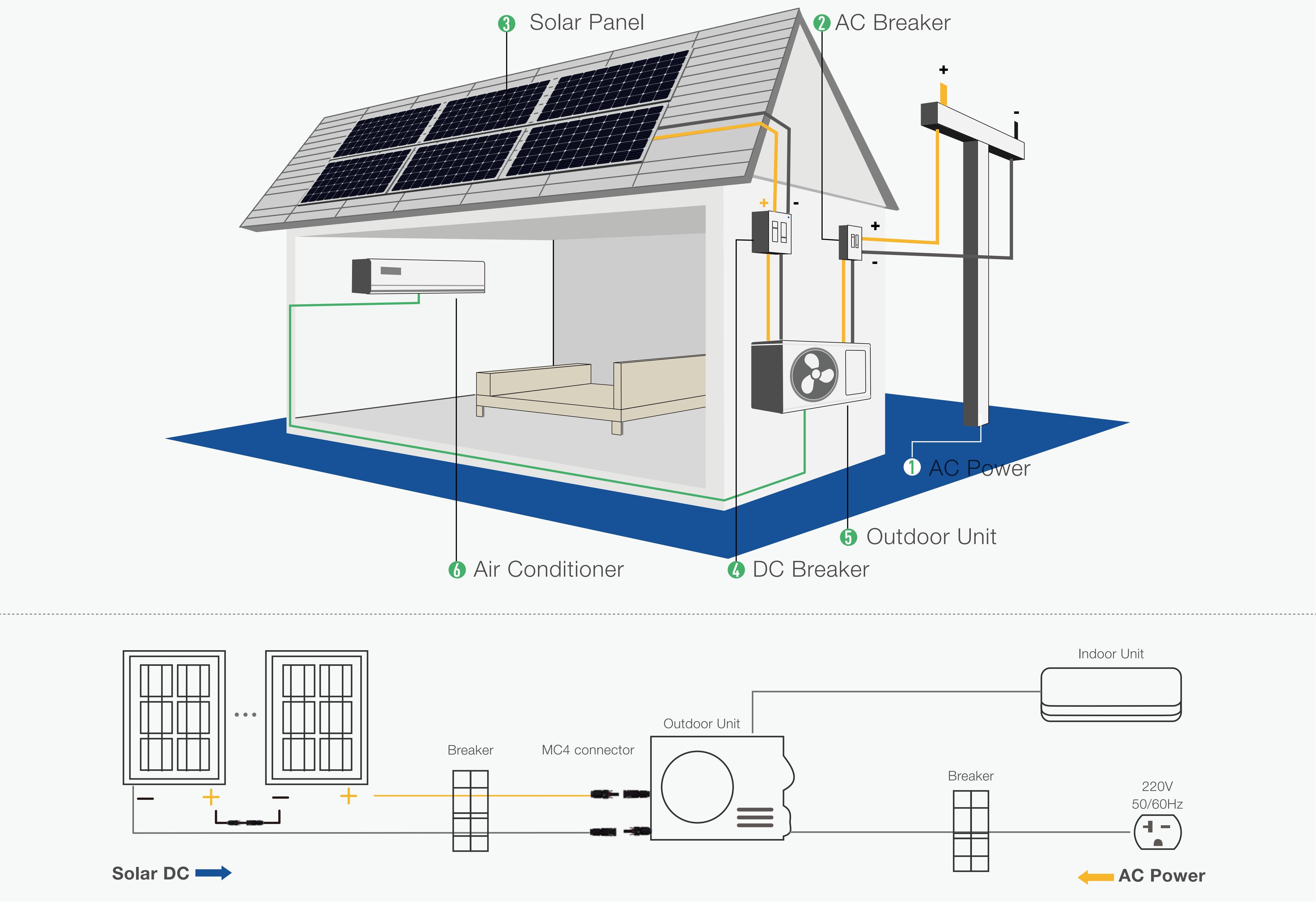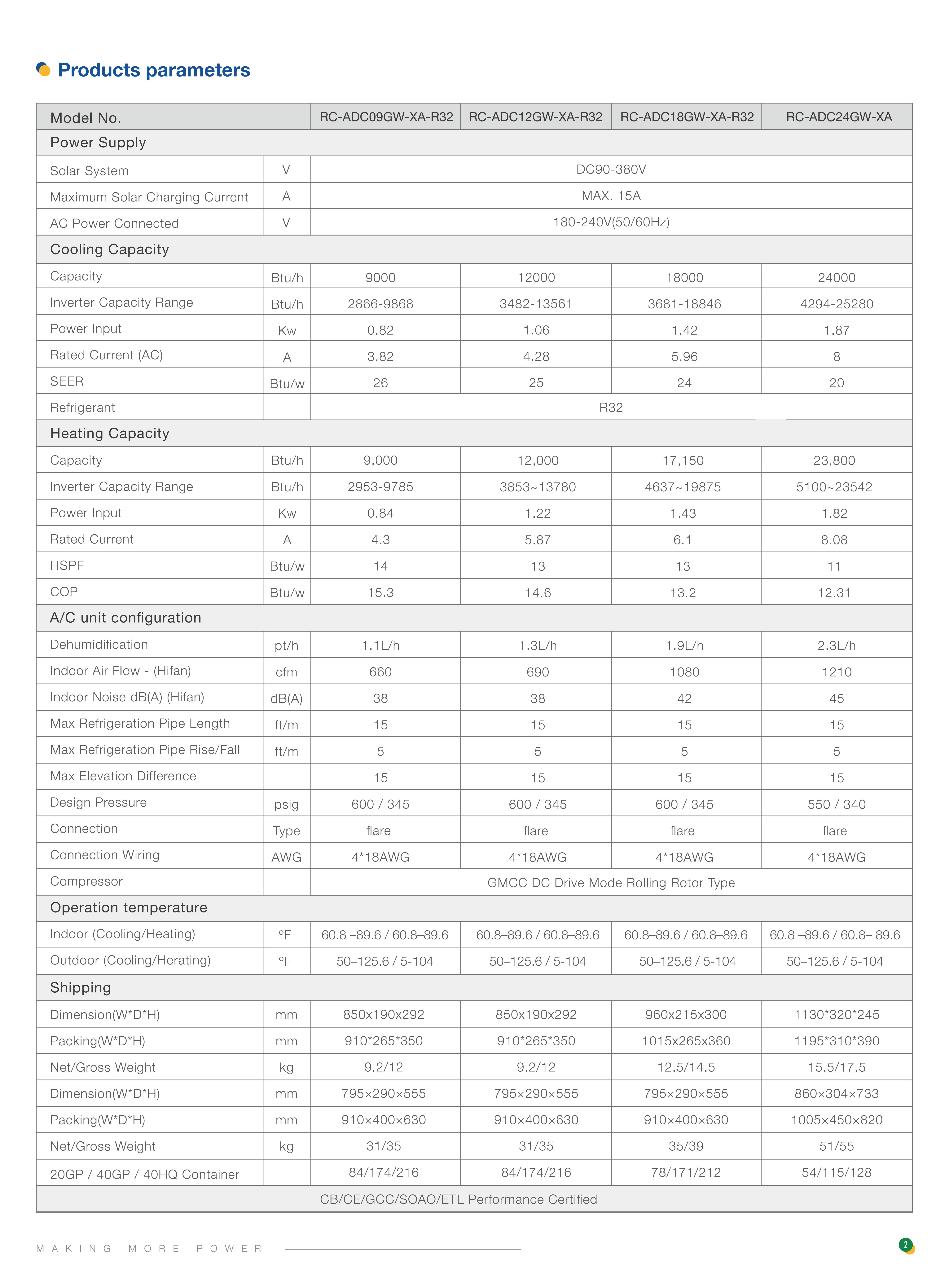Solar-powered air conditioners, also known as solar air conditioners, utilize solar energy to power the cooling process. The exact components and specifications may vary depending on the manufacturer and model.
Solar panel voltage:
DC90-380VMaximum Solar Charging Current:
15AAC Power Connected:
180-240V(50/60Hz)Refrigerant:
R32Compressor:
GMCC DC Drive Mode Rolling Rotor TypeConnection:
Flare
The efficiency of a solar air conditioner refers to how effectively it converts solar energy into cooling or heating. The efficiency depends on various factors, including the design of the system, the components used, and the operating conditions.
Typically, the efficiency of a solar air conditioner is described in terms of the coefficient of performance (COP) or the energy efficiency ratio (EER). COP is the ratio of the cooling or heating output to the electrical energy input, while EER is the ratio of the cooling output to the electrical power input.
Solar air conditioners can vary in efficiency depending on the specific technology employed. Common types include absorption-based systems and photovoltaic (PV) systems.
Absorption-based solar air conditioners use thermal energy from solar collectors to drive the cooling process. They typically have lower electrical efficiency compared to conventional vapor compression air conditioners but can achieve high overall efficiency due to the use of solar heat. The COP of absorption-based solar air conditioners can range from 0.5 to 1.2, depending on the system design and operating conditions.
Photovoltaic (PV) solar air conditioners, on the other hand, utilize electricity generated by solar panels to power the compressor and other components of the air conditioning system. The electrical efficiency of PV systems can be quite high; however, the overall system efficiency depends on factors such as the efficiency of the solar panels, the efficiency of the conversion from DC to AC power, and the efficiency of the air conditioning system itself. Overall, the system COP or EER for PV-based solar air conditioners can range from 2 to 5, again depending on various factors.
It's important to note that the efficiency of solar air conditioners can vary depending on climate conditions (solar energy availability), system size, installation quality, and maintenance. Therefore, it's recommended to consult specific manufacturers or experts in the field for accurate efficiency information regarding a particular solar air conditioning system.

Here are the basic components commonly found in solar air conditioners:
Solar Panels: Solar air conditioners are equipped with photovoltaic (PV) solar panels that convert sunlight into electricity. These panels are typically mounted on the roof or in a location where they can receive maximum sunlight exposure.
Batteries (Optional): Some solar air conditioners may include battery storage systems to store excess solar energy generated during the day. These batteries can be used to power the air conditioner during periods of low sunlight or at night.
Compressor: The compressor is the main component responsible for circulating the refrigerant and compressing it to create cooling effect. It requires electricity to function, which is supplied by the solar panels or batteries.
Controller/Inverter: Solar air conditioners are equipped with a controller or inverter that regulates the flow of electricity from the solar panels or batteries to the compressor. It ensures the air conditioner operates efficiently and optimizes the use of available solar power.
Regarding the performance of solar air conditioners in bad weather, it largely depends on the system design and the amount of sunlight available. Solar air conditioners can operate on cloudy days, but their efficiency and cooling capacity may be reduced compared to sunny days when more solar energy is available. Some systems may also incorporate battery storage to provide power during periods of low sunlight. It's important to consider the climate and local weather conditions when deciding to install a solar air conditioner and to consult with the manufacturer for specific details on its performance under different weather conditions.

The efficiency of a solar air conditioner depends on various factors, including the design of the system, the solar panels used, and the environmental conditions. Generally, solar air conditioners are designed to utilize solar energy to power the cooling process, reducing the reliance on grid electricity and providing a more sustainable cooling solution.
The efficiency of a solar air conditioner is typically measured by the Coefficient of Performance (COP), which is the ratio of cooling energy output to the energy input. A higher COP indicates higher efficiency. However, the specific efficiency of a solar air conditioner can vary depending on the specific model and design, so it's best to consult the manufacturer's specifications for accurate efficiency ratings.
As for guarantees, the guarantees and warranties offered for solar air conditioners can vary between manufacturers and models. It's essential to research and review the terms and conditions provided by the manufacturer or seller. These guarantees may cover aspects such as the performance of the system, the durability of components, and the overall product quality.
When considering purchasing a solar air conditioner, it's advisable to choose reputable brands or manufacturers that offer comprehensive warranties to ensure protection and peace of mind.
FAQs:
Q1: Do you support OEM/ODM?
A:Definitely, OEM&ODM service is supported with a certain quantity,including customize logo,package and label;
Q2: What's the production time?
A: The production time is normally 15 working days. but we will always prepare some stocks for popular models.
Q3: Can you provide DDP service?
A:Yes, if you are a personal customer and don't want to deal with the customs, we can provide DDP service to your address.
Q4: What about the warranty and how to claim?
A: Warranty period are 5 years since you receive the product, our professional after-sales team will deal with all warranty issues.